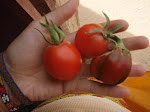
Millet field (photo from FAO)
I guess you have to realize that here people live hand to mouth, and even in the most optimistic of years, that fragile method doesn't change much. Think about my village: it's hot, there's no electricity: how could you possibly even store food for any period of time? It rots. I've had cabbages spoil in a day. So, to a certain extent, it is not as if you can stock up. Canned food, even boxed food is prohibitively expensive; to think that a family could afford even one meal of packaged food is unrealistic. That leaves you with whatever grain (millet, sorghum) or bean, or vegetable, that you can grow on your field, and whatever milk or meat you can get from your cows, goats, and sheep. And whatever food aid comes from abroad. I've only seen "my" villagers eat vegetables once, at a huge birth/naming celebration put on by the headmaster of the school; he has much more money than most. With the exception of onions and the occasional powdered tomato and okra that they put in sauces, people don't eat many veggies. (This might change here: working on it!)
Can you imagine doing one giant shopping trip to feed your whole family for a year? Now try changing that from a shopping trip to the planting of a millet field. That is what the villagers are working on right now. They are praying for rain, so they can plant millet in their fields, so that in three months they can hopefully harvest enough to pull their families through until next year's harvest. If that's not thinking ahead, what is?
Let's hope that people at least get a good harvest this year. Learning about the politics/environmental setting of all of this helps me to understand why it is that some farmers may seem "stubborn" to try out new methods: why make an already risky situation even more so?















